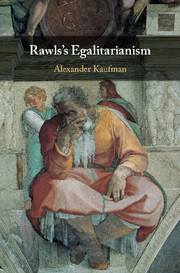Description
Rawls's Egalitarianism
Author: Kaufman Alexander
A new analysis of John Rawls's theory of distributive justice, focusing on the ways his ideas have both influenced and been misinterpreted by the current egalitarian literature.
Language: English
Subject for Rawls's Egalitarianism:
Rawls's Egalitarianism
Publication date: 01-2020
Support: Print on demand
Publication date: 01-2020
Support: Print on demand
Rawls's Egalitarianism
Publication date: 06-2018
280 p. · 15.8x23.5 cm · Hardback
Publication date: 06-2018
280 p. · 15.8x23.5 cm · Hardback
Description
/li>Contents
/li>Biography
/li>
This is a new interpretation and analysis of John Rawls's leading theory of distributive justice, which also considers the responding egalitarian theories of scholars such as Richard Arneson, G. A. Cohen, Ronald Dworkin, Martha Nussbaum, John Roemer, and Amartya Sen. Rawls's theory, Kaufman argues, sets out a normative ideal of justice that incorporates an account of the structure and character of relations that are appropriate for members of society viewed as free and equal moral beings. Forging an approach distinct amongst contemporary theories of equality, Rawls offers an alternative to egalitarian justice methodologies that aim primarily to compensate victims for undeserved bad luck. For Rawls, the values that ground the most plausible account of egalitarianism are real equality of economic opportunity combined with the guarantee of a fair distribution of social goods. Kaufman's analysis will be of interest to scholars and advanced students of political theory and political philosophy, particularly those working on justice, and on the work of John Rawls.
Introduction: democratic equality: retrieving Rawls's egalitarianism; 1. Rawls's practical conception of justice opinion, tradition and objectivity in political liberalism; 2. Stability, fit, and consensus; 3. Rawls and ethical constructivism; 4. A satisfactory minimum conception of justice reconsidering Rawls's maximin argument; 5. Cohen's ambiguities; 6. Justice as fairness and fair equality of opportunity; 7. Democratic equality; 8. Ideal theory and practical judgment; 9. Poverty, inequality, and justice.
Alexander Kaufman is Associate Professor of political science at the University of Georgia. His research explores the relation of central values of the democratic political tradition to issues in contemporary politics. His work examines the meaning and policy implications of the notions of freedom and equality that are centrally emphasized in the democratic tradition. Kaufman's research investigates these issues in the context of projects that examine the justification of the welfare state and the nature of egalitarian justice.
© 2024 LAVOISIER S.A.S.
These books may interest you

Egalitarianism 73.30 €

Egalitarianism 223.58 €

John Rawls and the Common Good 160.25 €

